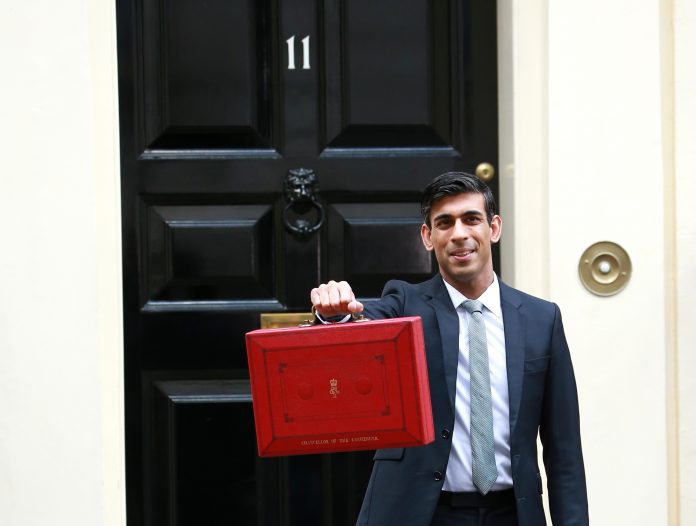Today (3 March) Chancellor Rishi Sunak unveiled the highly-anticipated 2021 budget, which proposes a variety of policy changes, including extension of the furlough scheme and funding domestic abuse “respite rooms”
In 2020, Chancellor Rishi Sunak announced a mini-budget of £30 billion to handle the urgent demands of COVID-19 on the UK economy.
Now, in 2021, over 123,000 people are dead from the highly infectious virus. The vaccination effort has reached over 20 million people who are vulnerable to hospitalisation and death. There are hopes that the vaccination process can protect all adults before June, enabling a steady re-opening of businesses, institutions and intermingling lives.
In anticipation of a less infectious future, Chancellor Sunak delivered details of the UK post-COVID budget for 2021 onwards. The budget report further suggests that “some economic scarring is expected.”
Speaking to the House of Commons, Chancellor Sunak said: “Since March, over 700,000 people have lost their jobs. Our economy has shrunk by 10% – the largest fall in over 300 years. Our borrowing is the highest it has been outside of wartime. It’s going to take this country – and the whole world – a long time to recover from this extraordinary economic situation.”
There has already been plenty of scarring across every sector. Here, we have dissected seven key measures that could immediately impact your day-to-day life.
1. Furlough will now be extended till September, 2021
The Government announced that the furlough scheme would now continue until September, 2021, with the Government paying 80% of employee salaries. Technically, furlough will continue till August – but in July, employers will be expected to put in 10% and this percentage will increase to 20% in August. This might mean that some employers change their mind about who is furloughed.
Analysis by the department found that staff who are “young, female, from an ethnic minority, and lower paid” have taken the largest amount of job losses via the pandemic, especially in the hospitality sector.
2. Mortgages (up to £600,000) will now need a 5% deposit
From April, 2021, people will be allowed to give a deposit of 5% on homes with a value up to £600,000. This move targets first-time buyers who are looking to get on the market. The scheme will also offer people the chanced to fix their initial mortgage rate for atleast five years, if desired. This window will close on 31 December, 2022, giving potential home-owners a 20 month window to make their move.
3. 600,000 self-employed people will be given support
The Self Employment Income Support scheme (SEISS) will be extended to September 2021, with people who filed a tax return in 2019-2020 now eligible to claim for the first time.
Support for the self-employed will continue with a 4th grant covering February to April, and a 5th grant from May.
As the tax return deadline has now passed, 600,000 more people, many of whom became self-employed last year, can now claim the 4th and 5th grants. #Budget2021 pic.twitter.com/1nJO2ZmPqn
— Rishi Sunak (@RishiSunak) March 3, 2021
4. £300 million for the arts via Culture Recovery Fund
The Government will add £300 million to the Culture Recovery Fund, which is currently worth £1.57 billion. The arts sector was hit hard by COVID-19, leading to a devastating time for individuals working in theatres and galleries across the UK. A further £90 million is expected for government-sponsored National Museums and cultural bodies across England.
A total of £408 million will go to the arts sector, but live music remains undiscussed at present.
5. Six month extension to Universal Credit, £20 a week
Universal credit will remain at £20 per week for a further six months in Great Britain, with the Government providing funding to Northern Ireland to make sure they can match this rate. There will also be a one-off payment of £500 to eligible Working Tax Credit recipients. A confirmed £5 million has been put towards maintaining this level of Universal Credit payment. The Government faced a lot of criticism over 2020 for opposing Free School Meals, which often go to families who are struggling to live on Universal Credit.
The budget mentions Free School Meals under the general education funding in the post-COVID budget, which will receive £2 billion.
6. New “respite rooms” for domestic abuse victims
Back in April, family Barrister Paula Rhone-Adrien called for significant Government intervention for domestic abuse victims isolated in their homes.
The Government have agreed to fund £19 million toward tackling domestic abuse, which will be channelled into working with offenders to reduce cyclical abuse. A further £4 million between 2021-2023 will be diverted into a trial of “respite rooms”, which will provide specialist support for homeless women facing the struggles of abuse and poverty.
Currently, £125 million has been announced for local authorities to deliver the Domestic Abuse Bill.
7. £100 will be the new limit for contactless payment
To boost spending, the Government has increased the previous £45 pound contactless card limit to £100, which will allow 3 payments in a row at £100 to happen as contactless transactions. If anything, this part of the post-COVID budget will make a surprisingly expensive food shop slightly less frustrating – no need for chip and pin.





![Europe’s housing crisis: A fundamental social right under pressure Run-down appartment building in southeast Europe set before a moody evening sky. High dynamic range photo. Please see my related collections... [url=search/lightbox/7431206][img]http://i161.photobucket.com/albums/t218/dave9296/Lightbox_Vetta.jpg[/img][/url]](https://www.openaccessgovernment.org/wp-content/uploads/2025/04/iStock-108309610-218x150.jpg)





